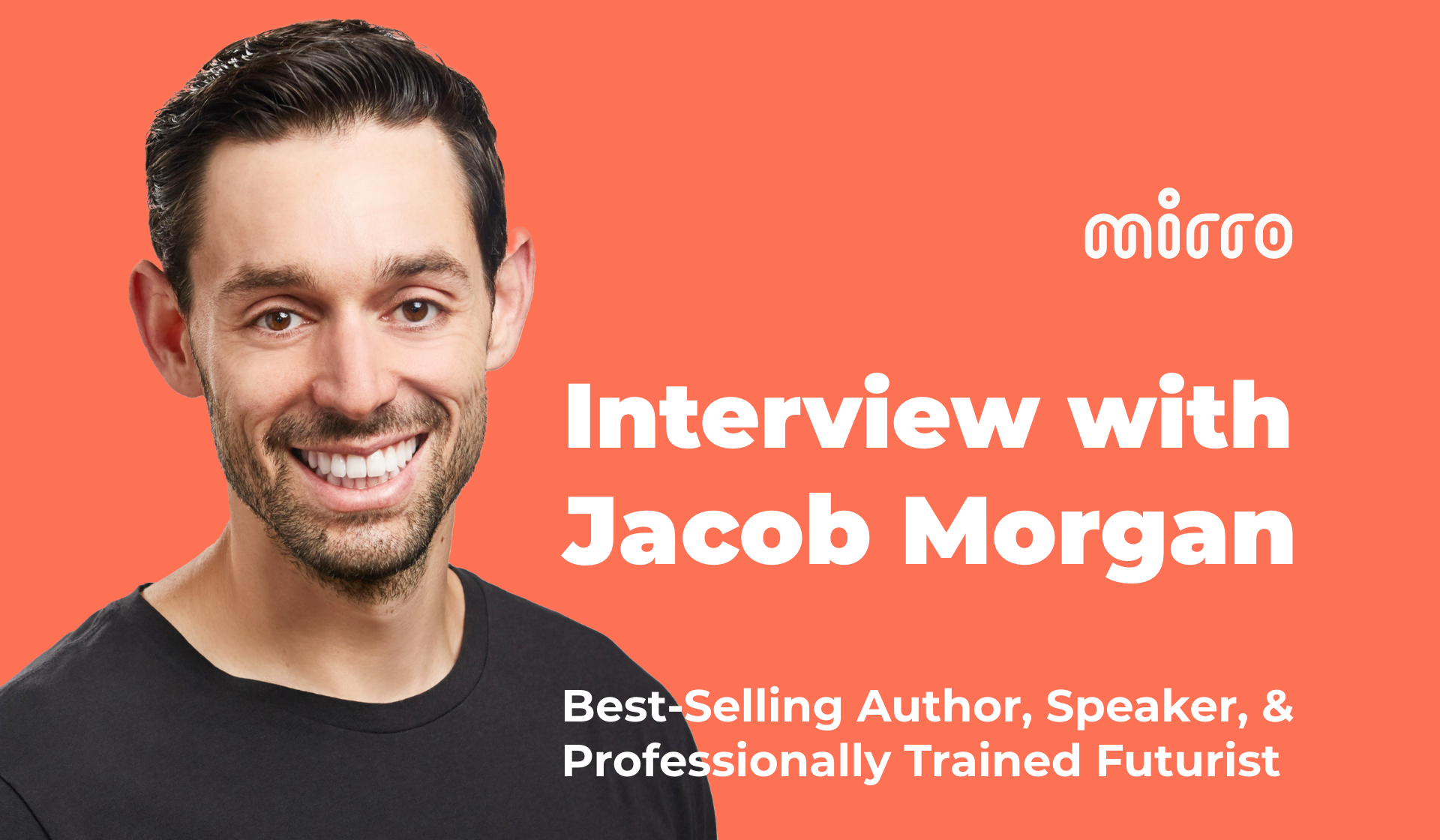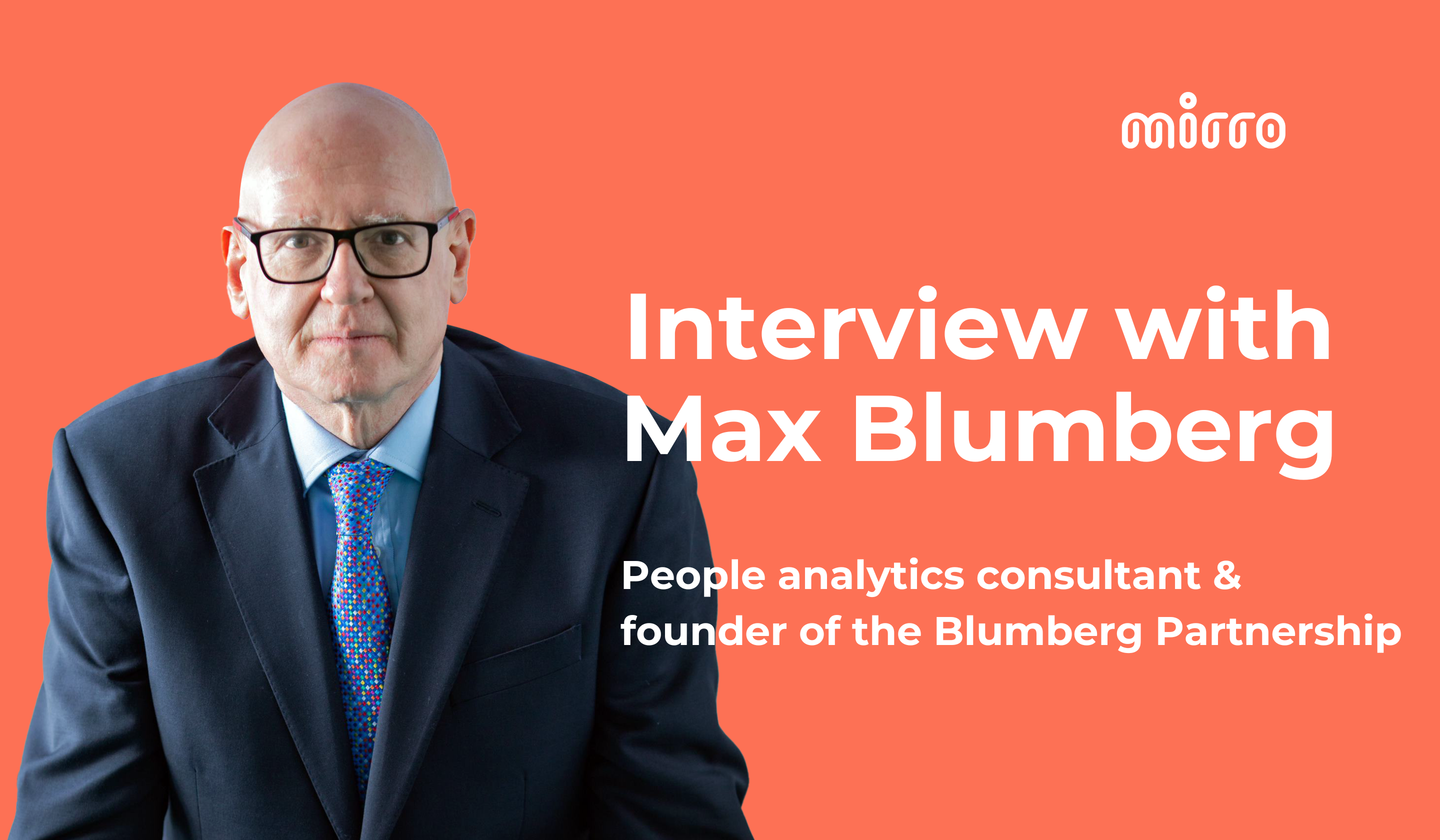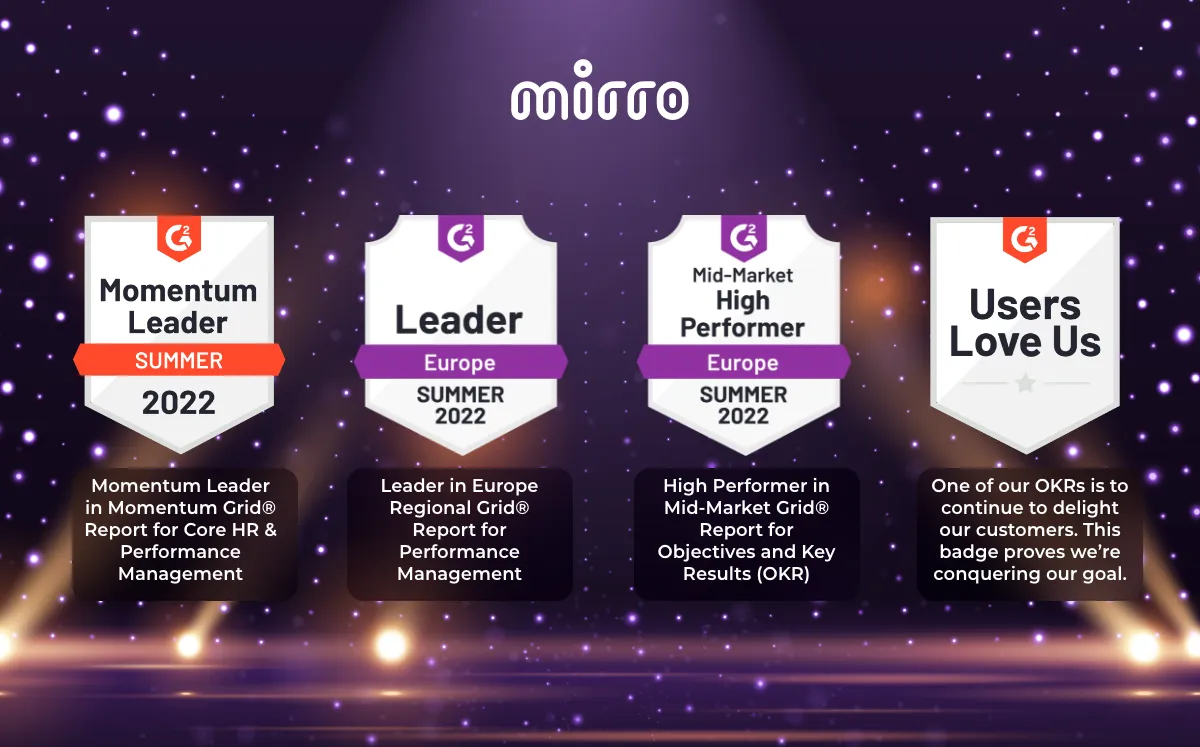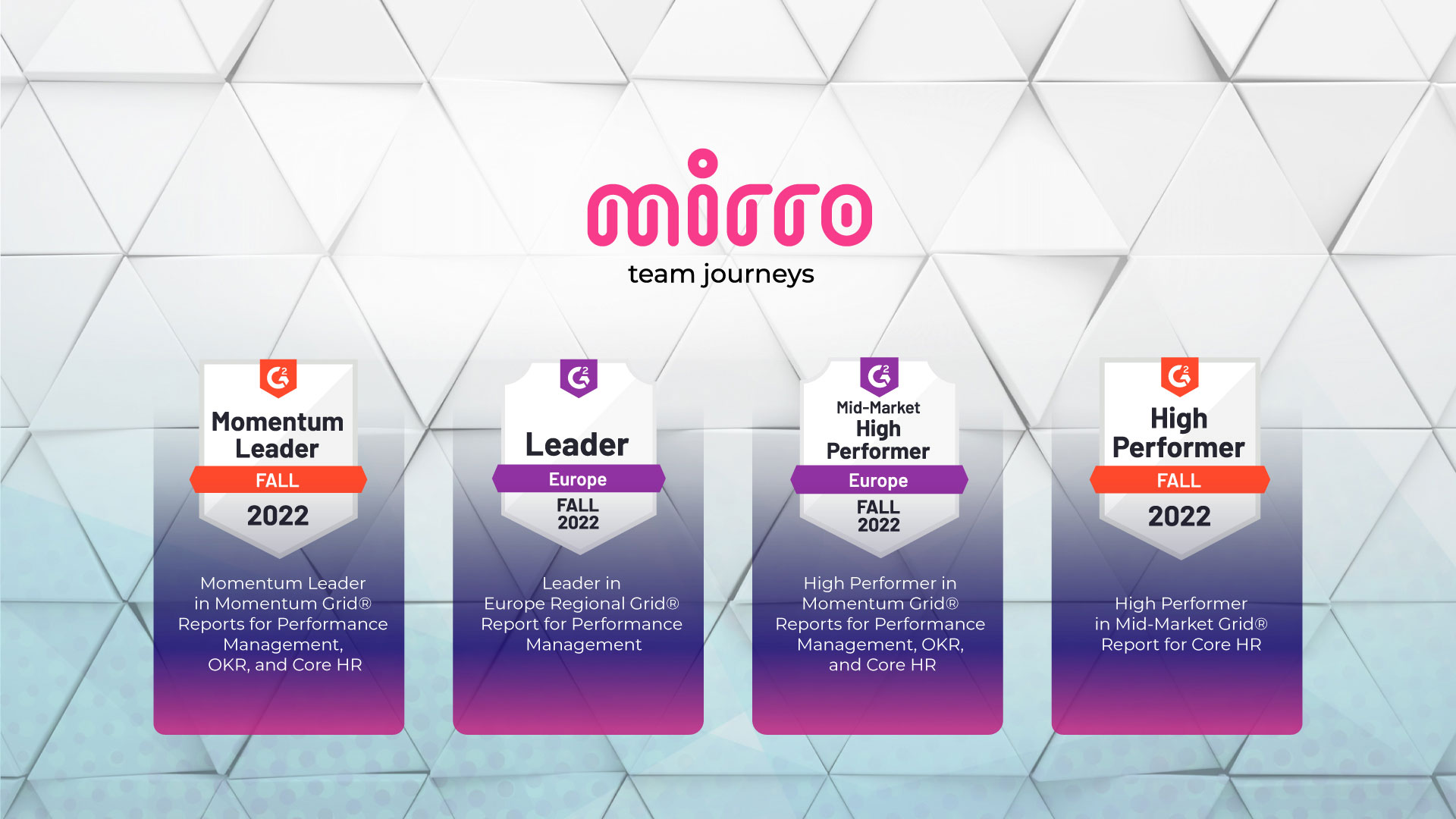SECTION
Jacob Morgan, Best-Selling Author: “AI will make it obvious who the bad leaders are”

Listen to this article:
A leader's ability to be vulnerable with their people, AI, people's perceptions, and the shifts in the modern workplace are all significant challenges for leadership today. In this context, leaders must demonstrate their competence, build trust and connection with their teams, and lead people toward being better versions of themselves.
To understand how to easily navigate the challenges in today’s leadership, improve employee experience, and prepare for the future of the workplace, we interviewed Jacob Morgan, the renowned author and keynote speaker. He has written five best-selling books, including his upcoming release in October, "Leading with Vulnerability: Unlock Your Greatest Superpower to Transform Yourself, Your Team, and Your Organization."
Jacob is also a respected speaker and a professionally trained futurist. His work has received endorsements from CEOs of prominent companies like Best Buy, Mastercard, Unilever, KPMG, Nestle, and Cisco, as well as acclaimed authors including Adam Grant, Mel Robbins, Patrick Lencioni, and Amy Edmondson. To learn more about Jacob’s expertise, visit TheFutureOrganization.com.
-1.png?width=2160&height=2160&name=An%20all-in%20one%20(1080%20x%201080%20px)-1.png)
Let’s dive into Jacob’s insights and advice for the modern leader!
Having dedicated over a decade to studying leadership, what notable positive shifts have you observed in this field up to this point?
Perhaps the most significant positive shift is that leadership is gradually becoming more human. We are seeing a greater emphasis on things like employee experience, putting people first, employee well-being, and, yes, even vulnerability. This shouldn't detract from the importance and value of competence, but why can't we have both? Leaders should be both competent and able to connect with their people; in other words, they can bring together leadership and vulnerability, which is exactly what my new book is all about.
What about the main challenges modern leaders face? Do you have any tips for helping them overcome these challenges?
In the context of my new book, the #1 challenge is that leaders don't want to be vulnerable because they don't want to be perceived as being weak or incompetent at work. This is, of course, understandable. However, the best way to overcome this challenge is not simply to be vulnerable but also to add leadership to the vulnerability. For example, if you make a mistake, don't just say, "I made a mistake; I'm sorry." That's vulnerable, but where is the leadership? Instead, say, "I made a mistake, I'm sorry. Here's what I learned from the mistake I made, and here's what I'm going to do to ensure that mistake doesn't happen again in the future." The best way to avoid the perception of being weak or incompetent when it comes to vulnerability is by also demonstrating the competence piece!
As a leader, if you had to do just one thing to foster connection and trust in your team, what would that be?
One of the people I interviewed for my book is Dr. Sim Sitkin. He's one of the world's leading experts on trust, and a few years ago, he and his colleagues researched this topic. They found that there are 22 different definitions of trust across various types of academic literature. But every single one of them has to do with vulnerability; in other words, trust cannot exist without vulnerability, which is doing or saying something that exposes you to the potential of emotional harm. As a leader, if you want to create trust and connection with your team, you need to get comfortable with being vulnerable, that is, talking about your challenges, mistakes, and failures. However, if you want to create trust without undermining your credibility, then it's also important to add the leadership/competence piece to the vulnerability, which is what I alluded to above.
High-performing teams often have a strong sense of purpose. How can leaders help their teams connect with a shared goal, especially during change or uncertainty?
Change and uncertainty are constant, meaning change and uncertainty will always exist. Creating a shared goal comes down to a few things. First, ensure you hire the right people from the get-go who understand what the company stands for, what it's trying to achieve, and what the organization's values are. Second, make sure that leaders lead by example to live out and practice those values. Third, telling stories and connecting the work that employees are doing with the impact that the work is having on either customers or employees. Lastly, make sure that the shared goal is constantly repeated, talked about, and shared with employees during meetings, calls, one-on-ones, etc.
Leading remote or hybrid teams has become increasingly common. What advice do you have for leaders to effectively lead, motivate, and maintain high performance in such distributed work environments?
I'm a big advocate of hybrid work, which, to clarify, doesn't mean working remotely 100% of the time. It means blending in-person with virtual work. I absolutely believe that there is still value for in-person work depending on the things that are getting done, such as leadership development, coaching, strategic business planning, and the like. Leaders need to do a better job of understanding the work that is being done and the best environment for that work to be done in. Sometimes, it will require in-person meetings, and sometimes it will allow virtual collaboration. Motivating and leading employees virtually is challenging primarily in terms of presence, so leaders need to ensure they are available and checking in on their teams regularly.
Your new book, "Leading with Vulnerability," is launching at the beginning of October 2023. What role does vulnerability play in today's workplace? Do you think leaders pay enough attention to it?
Absolutely not! In fact, when looking at the survey data from the 14,000 employees I collected with DDI, we found that when appropriate, managers often or always show a willingness to be vulnerable 30% compared to 29% for mid-level leaders and only 13% for senior-level leaders. We are much more comfortable with the traditional aspects of leadership, such as maintaining trust and confidentially, as opposed to the human aspects of leadership, such as being willing to be emotionally vulnerable or acknowledging failures or shortcomings.
Has your vulnerability as a leader ever been used against you? If yes, how did you handle this situation?
Of course. In fact, the one thing I can promise everyone is that at some point during your career, your vulnerability will be used against you, but it won't happen nearly as often as you think, so it's worth taking the chance and then learning when things don't go according to plan. Early on in my career, when I worked for a marketing agency, I shared with a co-worker that I was getting disengaged at work and was feeling beaten down by my supervisor. Sure enough, I was called into his office the next day and asked to confront him about what I said. My co-worker had shared everything I told him with our boss. I simply learned not to trust this person again and didn't stay at the company long after this happened.
You've discussed with more than 100 executives and leaders to research this book. What are the most valuable things you learned from these discussions that made you never look at leadership the same way again?
The most important lesson is that we should always blend competence with connection or leadership with vulnerability. I found that most are, of course, familiar with vulnerability, and leaders do believe in and understand the concept of vulnerability. However, they are oftentimes left paralyzed in trying to understand how to practice it inside their organizations. Most of us either focus on connecting with our peers or on being really good at our jobs. We must be able to do both. My hope is that after reading this book, more people will realize that and also walk away with the tools needed to make it happen.
Given your expertise in leadership, how do you see this area evolving in the near future?
My hope is that the big focus will be on leading with vulnerability. Bringing in more of the human aspects of work while not forgetting that being good at your job still matters. Vulnerability is still a foreign concept for most leaders and most employees in general. Yet, at the same time, we cannot learn, grow, and develop without vulnerability.
How do you think AI will impact leadership? Do you believe leaders are keen on embracing AI and refining their leadership style with its help?
AI will make it obvious who the bad leaders are. If you think about what a bad leader does, they focus on command and control, delegation, pure decision-making, and basically running the ship. AI is now able to make decisions far better than most humans can and has the ability to advise employees. A great leader, on the other hand, can do all of the above plus also coach, motivate, inspire, and unlock the potential of others. So, if you're a terrible leader and AI can take your job, then what value do you bring? Similarly, if you're a great leader and AI takes away some of the strategy and decision-making pieces of your role, now your value actually increases because so few people excel in the human aspect of leadership.
What about the future of the workplace? How are things currently changing? Is it for the better?
I've always been an advocate for hybrid work. What we have going on now is a battle between people who never want to show up to work versus leaders who always want their employees to show up to work. Hybrid, on the other hand, means paying attention to the type of work that someone is doing and what environment that work is getting done in. This means having a blend of virtual work when it calls for it and being in-person when needed. If we can get to this point, then yes, it will be for the better.
Let's also talk about employee experience. Why do you think it took companies so long to look into improving their employee experience?
It's a never-ending journey, and they are still working on it now. Employee experience is a combination of 3 environments that organizations can control: culture, technology, and space. For decades, we have been focused on employee engagement, which is the idea of giving employees perks and benefits to distract them from the sad reality of their jobs. Experience, on the other hand, is about changing the core workplace practices of an organization to focus on the people. Using a car analogy, it's like changing the paint versus the engine.
Where should companies that want to create better experiences for their employees start?
First, remember the employee experience equation: Culture X Technology X Space = Employee Experience. Everything you do should be run through that filter of how it's going to impact how employees feel working for you, the tools and resources they have access to in order to do their jobs, and the spaces in which they work. Second, instead of just focusing on the employee life cycle, focus on the moments that matter to the lives of your employees. Lastly, treat your company like a factory, not a laboratory, meaning focus on testing, experimenting, innovating, and learning from failure.
What are the current trends in employee experience? How is this area of the modern workplace evolving?
The big trend for me is getting back to employee experience basics, which is an emphasis on culture, technology, and space. Over the past few years, we have lost sight of what it means to put people first and what it means to focus on employee experience, as we have all been scrambling to figure out what we are doing and how we are doing it. 2023 and even most of 2024 is going to be about employee experience fundamentals, meaning taking a step back to define what it means and how to focus on it.
And finally, what's next for you?
The launch of my new book, "Leading With Vulnerability", which is just coming out! I’m looking to focus on creating more content around this crucial space.





